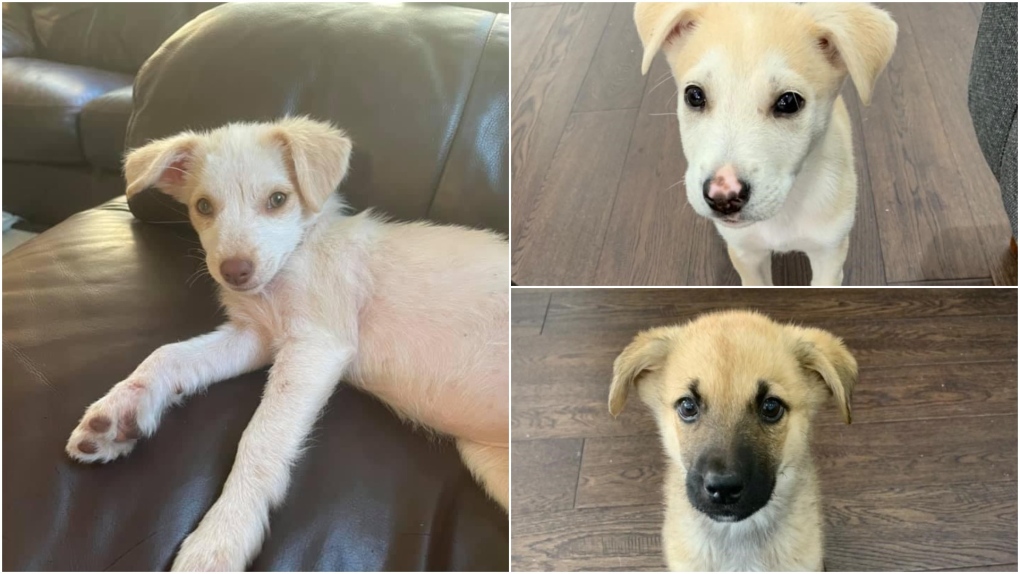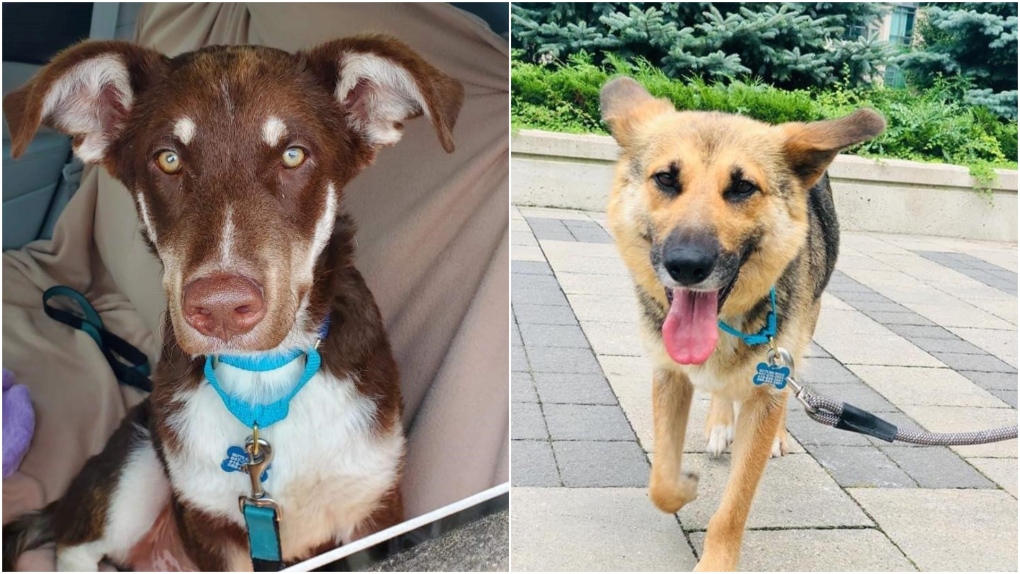Toronto rescue drives to Manitoba to donate food, brings back 16 dogs displaced by fires
 Two dogs are transported to Toronto from Winnipeg after being rescued. (MUTTS Dog Rescue)
Two dogs are transported to Toronto from Winnipeg after being rescued. (MUTTS Dog Rescue)
Sixteen dogs displaced in Manitoba due to raging wildfires were transported to Toronto earlier this month and the rescue says it is hoping to make another trip in September.
Wildfires in northeastern Manitoba have forced residents in multiple remote Indigenous communities to evacuate, leaving their homes and, in some instances, their pets behind.
Over the past month, members of the Manitoba Animal Alliance have been flying into the communities to find those lost pets, many who were sick or injured. In total, more than 600 pets have been rescued. The group treats the animals, reunites them with their owners, and in the case of strays, finds a place at a rescue.
In Toronto, MUTTS Dog Rescue watched the situation unfold carefully, knowing how much work it would take not only to find the dogs, but also to feed and care for them.
On Aug. 1, volunteers gathered more than 100 bags of food and drove 22 hours to Manitoba.
“We just thought we'd step in and help them,” Ni Chen, co-founder and director at MUTTS Dog Rescue, told CTV News Toronto on Thursday. “At least give them a little bit of relief in being able to help the animals.
“So then, while we're there, obviously we brought back dogs to be placed in various rescue organizations in and around Toronto, so that they have space for to bring in more dogs and we have lots of homes who want to adopt these dogs.”
Two days later, the volunteers were on their way back to Toronto.
Chen said are about 100 dogs being cared for by the Manitoba Animal Alliance currently.
Overall, the 16 dogs that came to Toronto were in decent shape, Chen added.
 Three dogs--Arrow, Scout and Ace--are seen in this photograph provided by MUTTS Dog Rescue.
Three dogs--Arrow, Scout and Ace--are seen in this photograph provided by MUTTS Dog Rescue.
“A lot of the times we expect dogs to have internal parasites mainly because there's a dire lack of health care for animals and humans in these remote areas,” she said. “So we're working on getting medication for that, and then there's a trio of puppies that we brought in … one of the puppies, tested positive for scabies, so sarcoptic mange. And so all of the puppies are being treated for that.”
“Then, your general fleas and ticks. That usually is found on dogs when they come in.”
MUTTS launched a GoFundMe page at the end of July to help raise funds for the trip, as well as to help pay for veterinary services for the animals. All of the money is being used to get the dogs healthy, Chen said.
 Two dogs--Koda and Rya--are seen in this photograph provided by MUTTS Dog Rescue.
Two dogs--Koda and Rya--are seen in this photograph provided by MUTTS Dog Rescue.
In September, the rescue is planning a second trip to Manitoba. They say they hope to bring about the same number of dogs back with them.
“I think now, from what I’ve read, the dogs coming in a little bit rougher because, again, the communities have been evacuated and the fires are really closing in on them, so the dogs that are currently coming into Winnipeg are a little worse for wear.”
Melanie Chudyk, the clinic coordinator for the Manitoba Animal Alliance, told CTV News Winnipeg that she has travelled to twice to Pauingassi First Nation, a community rather close to the wildfires, and said the smoke was so thick it was hard to breathe.
We have to make some really tough calls,” Chudyk said at the time.
“We have to say, ‘this one’s healthy enough to stay for another few days,’ but it’s difficult. It’s really difficult to make that decision, because we’ve had animals in crates ready to be loaded into helicopters and we’ve had to let them go because we just don’t have space for them.”
Chen said that MUTTS is always looking for foster homes, adding that two more dogs are being transported from Winnipeg to Toronto by plane next week.
“If anybody is flying from Winnipeg to Toronto, they can reach out to us to be flight parents. We just put kennels under their flight ticket. There's no cost to them.”
CTVNews.ca Top Stories

'They needed people inside Air Canada:' Police announce arrests in Pearson gold heist
Police say one former and one current employee of Air Canada are among the nine suspects that are facing charges in connection with the gold heist at Pearson International Airport last year.
House admonishes ArriveCan contractor in rare parliamentary show of power
MPs enacted an extraordinary, rarely used parliamentary power on Wednesday, summonsing an ArriveCan contractor to appear before the House of Commons where he was admonished publicly and forced to provide answers to the questions MPs said he'd previously evaded.
Leafs star Auston Matthews finishes season with 69 goals
Auston Matthews won't be joining the NHL's 70-goal club this season.
Trump lawyers say Stormy Daniels refused subpoena outside a Brooklyn bar, papers left 'at her feet'
Donald Trump's legal team says it tried serving Stormy Daniels a subpoena as she arrived for an event at a bar in Brooklyn last month, but the porn actor, who is expected to be a witness at the former president's criminal trial, refused to take it and walked away.
Why drivers in Eastern Canada could see big gas price spikes, and other Canadians won't
Drivers in Eastern Canada face a big increase in gas prices because of various factors, especially the higher cost of the summer blend, industry analysts say.
Doug Ford calls on Ontario Speaker to reverse Queen's Park keffiyeh ban
Ontario Premier Doug Ford is calling on Speaker Ted Arnott to reverse a ban on keffiyehs at Queen's Park, describing the move as “needlessly” divisive.
'A living nightmare': Winnipeg woman sentenced following campaign of harassment against man after online date
A Winnipeg woman was sentenced to house arrest after a single date with a man she met online culminated in her harassing him for years, and spurred false allegations which resulted in the innocent man being arrested three times.
Woman who pressured boyfriend to kill his ex in 2000s granted absences from prison
A woman who pressured her boyfriend into killing his teenage ex more than a decade ago will be allowed to leave prison for weeks at a time.
Customers disappointed after email listing $60K Tim Hortons prize sent in error
Several Tim Horton’s customers are feeling great disappointment after being told by the company that an email stating they won a boat worth nearly $60,000 was sent in error.
































